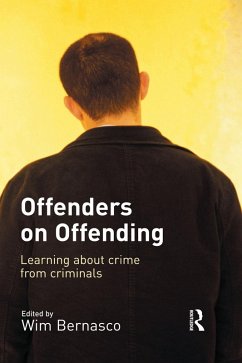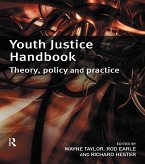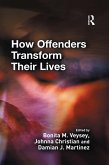Offenders on Offending (eBook, ePUB)
Learning about Crime from Criminals
Redaktion: Bernasco, Wim
51,95 €
51,95 €
inkl. MwSt.
Sofort per Download lieferbar

26 °P sammeln
51,95 €
Als Download kaufen

51,95 €
inkl. MwSt.
Sofort per Download lieferbar

26 °P sammeln
Jetzt verschenken
Alle Infos zum eBook verschenken
51,95 €
inkl. MwSt.
Sofort per Download lieferbar
Alle Infos zum eBook verschenken

26 °P sammeln
Offenders on Offending (eBook, ePUB)
Learning about Crime from Criminals
Redaktion: Bernasco, Wim
- Format: ePub
- Merkliste
- Auf die Merkliste
- Bewerten Bewerten
- Teilen
- Produkt teilen
- Produkterinnerung
- Produkterinnerung

Bitte loggen Sie sich zunächst in Ihr Kundenkonto ein oder registrieren Sie sich bei
bücher.de, um das eBook-Abo tolino select nutzen zu können.
Hier können Sie sich einloggen
Hier können Sie sich einloggen
Sie sind bereits eingeloggt. Klicken Sie auf 2. tolino select Abo, um fortzufahren.

Bitte loggen Sie sich zunächst in Ihr Kundenkonto ein oder registrieren Sie sich bei bücher.de, um das eBook-Abo tolino select nutzen zu können.
The book addresses the issue of assessing the reliability of information about crime from offenders, taking stock of the various methods used to elicit information on offending from offenders and collecting useful information on criminal behaviour.
- Geräte: eReader
- mit Kopierschutz
- eBook Hilfe
- Größe: 3.34MB
Andere Kunden interessierten sich auch für
![Youth Justice Handbook (eBook, ePUB) Youth Justice Handbook (eBook, ePUB)]() Youth Justice Handbook (eBook, ePUB)47,95 €
Youth Justice Handbook (eBook, ePUB)47,95 €![Dangerous Offenders (eBook, ePUB) Dangerous Offenders (eBook, ePUB)]() Dangerous Offenders (eBook, ePUB)49,95 €
Dangerous Offenders (eBook, ePUB)49,95 €![Rethinking What Works with Offenders (eBook, ePUB) Rethinking What Works with Offenders (eBook, ePUB)]() Stephen FarrallRethinking What Works with Offenders (eBook, ePUB)39,95 €
Stephen FarrallRethinking What Works with Offenders (eBook, ePUB)39,95 €![Hate and Bias Crime (eBook, ePUB) Hate and Bias Crime (eBook, ePUB)]() Hate and Bias Crime (eBook, ePUB)63,95 €
Hate and Bias Crime (eBook, ePUB)63,95 €![How Offenders Transform Their Lives (eBook, ePUB) How Offenders Transform Their Lives (eBook, ePUB)]() How Offenders Transform Their Lives (eBook, ePUB)41,95 €
How Offenders Transform Their Lives (eBook, ePUB)41,95 €![Treating Sex Offenders (eBook, ePUB) Treating Sex Offenders (eBook, ePUB)]() Sarah BrownTreating Sex Offenders (eBook, ePUB)45,95 €
Sarah BrownTreating Sex Offenders (eBook, ePUB)45,95 €![Young Adult Offenders (eBook, ePUB) Young Adult Offenders (eBook, ePUB)]() Young Adult Offenders (eBook, ePUB)39,95 €
Young Adult Offenders (eBook, ePUB)39,95 €-
-
-
The book addresses the issue of assessing the reliability of information about crime from offenders, taking stock of the various methods used to elicit information on offending from offenders and collecting useful information on criminal behaviour.
Dieser Download kann aus rechtlichen Gründen nur mit Rechnungsadresse in A, B, BG, CY, CZ, D, DK, EW, E, FIN, F, GR, HR, H, IRL, I, LT, L, LR, M, NL, PL, P, R, S, SLO, SK ausgeliefert werden.
Produktdetails
- Produktdetails
- Verlag: Taylor & Francis
- Seitenzahl: 328
- Erscheinungstermin: 11. Januar 2013
- Englisch
- ISBN-13: 9781134030101
- Artikelnr.: 41218390
- Verlag: Taylor & Francis
- Seitenzahl: 328
- Erscheinungstermin: 11. Januar 2013
- Englisch
- ISBN-13: 9781134030101
- Artikelnr.: 41218390
- Herstellerkennzeichnung Die Herstellerinformationen sind derzeit nicht verfügbar.
Wim Bernesco is a Senior Researcher within the NSCR Mobility and Distribution of Crime group. His current research interests include spatial aspects of criminal activities, including variations in crime and delinquency between neighbourhoods, offender travel behaviour and target selection, and crime displacement. Michael Tonry is Professor of Law at the University of Minnesota. He specializes in criminal law.
Foreword PrefacePart 1: Setting the Stage 1. Learning About Crime from
Criminals: Editor's Introduction 2. Misinformation, Misunderstanding and
Misleading as Validity Threats to Offenders' Accounts of Offending 3.
Apprehending Criminals: The Impact of Law on Offender-based ResearchPart 2:
Prison Settings 4. Interviewing the Incarcerated: Pitfalls and Promises5.
Interviewing and Validity Issues in Self-report Research with Incarcerated
Offenders: The Quebec Inmate Survey6. Beyond the Interview: Complementing
and Validating Accounts of Incarcerated Violent OffendersPart 3: Field
Settings 7. Method, Actor and Context Triangulations: Knowing What Happened
During Criminal Events and the Motivations for Getting Involved 8. Repeat,
Triangulate and Reflect: Ethnographic Validity in a Study on Urban Minority
Youth 9. Getting Good Data from People that Do Bad Things: Effective
Methods and Techniques for Conducting Research with Hard-to-Reach and
Hidden PopulationsPart 4: Social Categories of Offenders and Researchers
10. The Impact of Gender when Interviewing 'Offenders on Offending' 11.
Talking to Snakeheads: Methodological Considerations for Research on
Chinese Human Smuggling 12. Blue-collar, White-collar: Crimes and Mistakes
Part 5: Learning About the Actn 13. Research on Residential Burglary: Ways
of Improving Validity and Participants' Recall when Gathering Data 14. The
Use of Maps in Offender Interviewing 15. Interviewing Offenders in a
Penitentiary Environment and the Use of Mental Maps During Interviews 16.
Validating Offenders' Accounts: Learning from Offender Interviews with Bank
Robbers in Austrian Prisons
Criminals: Editor's Introduction 2. Misinformation, Misunderstanding and
Misleading as Validity Threats to Offenders' Accounts of Offending 3.
Apprehending Criminals: The Impact of Law on Offender-based ResearchPart 2:
Prison Settings 4. Interviewing the Incarcerated: Pitfalls and Promises5.
Interviewing and Validity Issues in Self-report Research with Incarcerated
Offenders: The Quebec Inmate Survey6. Beyond the Interview: Complementing
and Validating Accounts of Incarcerated Violent OffendersPart 3: Field
Settings 7. Method, Actor and Context Triangulations: Knowing What Happened
During Criminal Events and the Motivations for Getting Involved 8. Repeat,
Triangulate and Reflect: Ethnographic Validity in a Study on Urban Minority
Youth 9. Getting Good Data from People that Do Bad Things: Effective
Methods and Techniques for Conducting Research with Hard-to-Reach and
Hidden PopulationsPart 4: Social Categories of Offenders and Researchers
10. The Impact of Gender when Interviewing 'Offenders on Offending' 11.
Talking to Snakeheads: Methodological Considerations for Research on
Chinese Human Smuggling 12. Blue-collar, White-collar: Crimes and Mistakes
Part 5: Learning About the Actn 13. Research on Residential Burglary: Ways
of Improving Validity and Participants' Recall when Gathering Data 14. The
Use of Maps in Offender Interviewing 15. Interviewing Offenders in a
Penitentiary Environment and the Use of Mental Maps During Interviews 16.
Validating Offenders' Accounts: Learning from Offender Interviews with Bank
Robbers in Austrian Prisons
Foreword PrefacePart 1: Setting the Stage 1. Learning About Crime from
Criminals: Editor's Introduction 2. Misinformation, Misunderstanding and
Misleading as Validity Threats to Offenders' Accounts of Offending 3.
Apprehending Criminals: The Impact of Law on Offender-based ResearchPart 2:
Prison Settings 4. Interviewing the Incarcerated: Pitfalls and Promises5.
Interviewing and Validity Issues in Self-report Research with Incarcerated
Offenders: The Quebec Inmate Survey6. Beyond the Interview: Complementing
and Validating Accounts of Incarcerated Violent OffendersPart 3: Field
Settings 7. Method, Actor and Context Triangulations: Knowing What Happened
During Criminal Events and the Motivations for Getting Involved 8. Repeat,
Triangulate and Reflect: Ethnographic Validity in a Study on Urban Minority
Youth 9. Getting Good Data from People that Do Bad Things: Effective
Methods and Techniques for Conducting Research with Hard-to-Reach and
Hidden PopulationsPart 4: Social Categories of Offenders and Researchers
10. The Impact of Gender when Interviewing 'Offenders on Offending' 11.
Talking to Snakeheads: Methodological Considerations for Research on
Chinese Human Smuggling 12. Blue-collar, White-collar: Crimes and Mistakes
Part 5: Learning About the Actn 13. Research on Residential Burglary: Ways
of Improving Validity and Participants' Recall when Gathering Data 14. The
Use of Maps in Offender Interviewing 15. Interviewing Offenders in a
Penitentiary Environment and the Use of Mental Maps During Interviews 16.
Validating Offenders' Accounts: Learning from Offender Interviews with Bank
Robbers in Austrian Prisons
Criminals: Editor's Introduction 2. Misinformation, Misunderstanding and
Misleading as Validity Threats to Offenders' Accounts of Offending 3.
Apprehending Criminals: The Impact of Law on Offender-based ResearchPart 2:
Prison Settings 4. Interviewing the Incarcerated: Pitfalls and Promises5.
Interviewing and Validity Issues in Self-report Research with Incarcerated
Offenders: The Quebec Inmate Survey6. Beyond the Interview: Complementing
and Validating Accounts of Incarcerated Violent OffendersPart 3: Field
Settings 7. Method, Actor and Context Triangulations: Knowing What Happened
During Criminal Events and the Motivations for Getting Involved 8. Repeat,
Triangulate and Reflect: Ethnographic Validity in a Study on Urban Minority
Youth 9. Getting Good Data from People that Do Bad Things: Effective
Methods and Techniques for Conducting Research with Hard-to-Reach and
Hidden PopulationsPart 4: Social Categories of Offenders and Researchers
10. The Impact of Gender when Interviewing 'Offenders on Offending' 11.
Talking to Snakeheads: Methodological Considerations for Research on
Chinese Human Smuggling 12. Blue-collar, White-collar: Crimes and Mistakes
Part 5: Learning About the Actn 13. Research on Residential Burglary: Ways
of Improving Validity and Participants' Recall when Gathering Data 14. The
Use of Maps in Offender Interviewing 15. Interviewing Offenders in a
Penitentiary Environment and the Use of Mental Maps During Interviews 16.
Validating Offenders' Accounts: Learning from Offender Interviews with Bank
Robbers in Austrian Prisons







